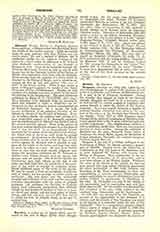

Berenger, PIERRE (PETER OF POITIERS, PETRUS SCHOLASTICUS), a French writer who flourished about the middle of the twelfth century. From the second name we may, perhaps, infer that Poitiers was his native place. He was a disciple of Abelard, and is celebrated chiefly for his vigorous defense of his master in a letter which he addressed to St. Bernard after Abelard’s condemnation at the Council of Soissons in 1141. Later on he wandered through the Cevennes Mountains, hunted, he tells us, not by wild beasts, but by the Christian faithful of the Diocese of Mende, who apparently took sides with St. Bernard. Those attacks were the occasion of a letter which he directed to the Bishop of Mende, and in which he retracted all that he had said against “the man of God” in his former epistle. There is also extant a letter of Berenger’s against the monks of the Grand Chartreux (Contra Carthusienses). Finally, we find mention of a treatise, now lost, in which he discussed the doctrine of the Incarnation. The three letters are published by Migne (P.L., CLXXVIII, 1857 sqq.). That addressed to St. Bernard, while not wanting in grace and elegance of style, is altogether too intemperate in tone to deserve serious consideration as an historical document. In it occurs the well-known description of an informal meeting of the bishops on the eve of the Council of Soissons. If we are to believe Pierre, the prelates were primed in a most disgraceful manner in St. Bernard’s interests, and the condemnation of Abelard was decided before the council actually opened. Even if the author of this story had not afterwards excused it on the ground that it was the work of an inconsiderate youth, overcome by the ador of his devotion to his teacher, the violent tone of the letter itself would be enough to condemn it. In the letter to the Bishop of Mende Pierre protests that he would recall all that he has written against St. Bernard were it possible to suppress all the copies of the letter, and begs that what he wrote be taken as a jest. He goes even farther when he says that his more mature judgment condemns the doctrines attributed by St. Bernard to Abelard—not, indeed, because they are untrue, but because they are unsafe. The invective against the Carthusians pays high tribute to the rule of the order, but finds fault with the proclivity of the members of the order to indulge in malicious gossip. Pierre exhibited many of the traits of his master. He was by nature a lover of contention, totally devoid of respect for the prestige of either person or institution. His sole merit was the undeniable vivacity and brilliancy of his style and his unusually extensive acquaintance with the poets of classical antiquity. He professed his devotion to Catholic dogma and apparently maintained that Abelard, though he had spoken of matters of faith in a manner novel and unsafe, had not been guilty of formal heresy, and had not been treated with that mercy to which his love of Catholic truth, as he saw it, entitled him.
WILLIAM TURNER

